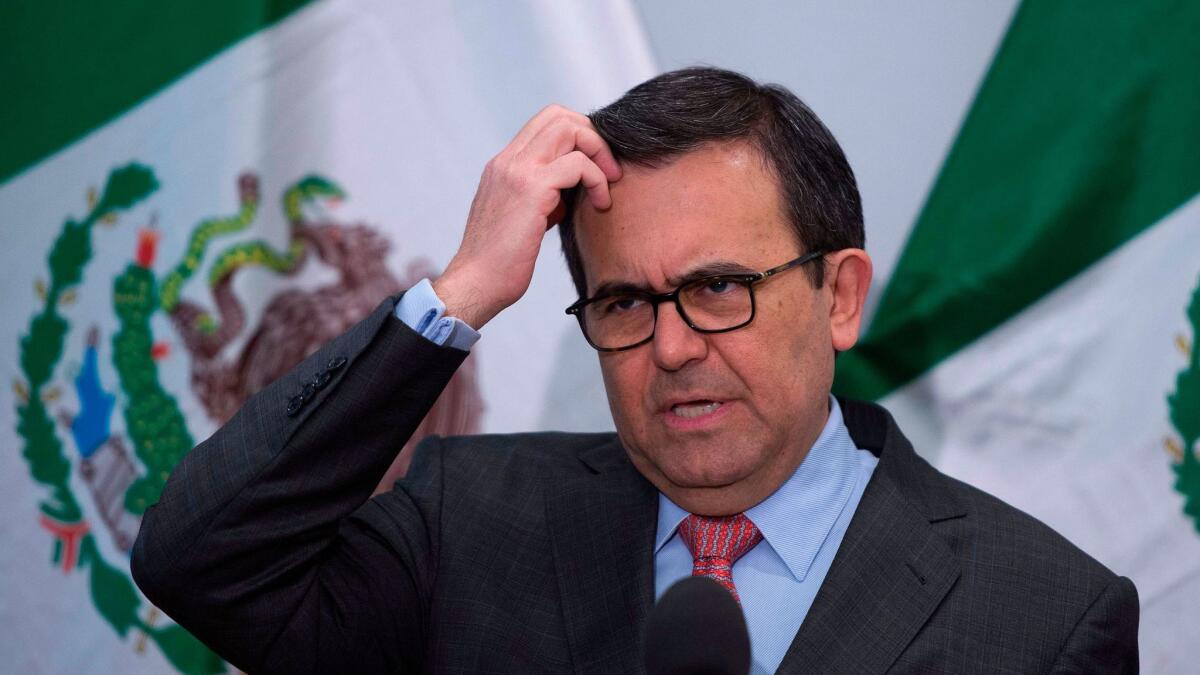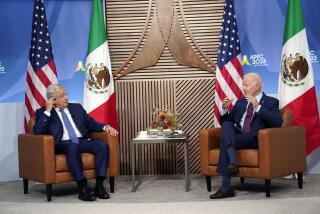Latest round of NAFTA talks opens in Mexico, with few prospects for breakthroughs

Mexico is signaling both flexibility and doubt about the latest demands from Washington as the fifth round of talks on the future of the North American Free Trade Agreement formally opened Friday in the Mexican capital.
The fate of NAFTA has become a kind of national fixation in Mexico, where the almost quarter-century-old trade pact between the United States, Canada and Mexico has evolved into an economic mainstay.
Mexican officials have been walking a fine political line as they battle to maintain a deal seen as crucial to economic growth — and, at the same time, stand up publicly to what many here view as a bullying attitude from the Trump administration.
Trump has repeatedly threatened to pull out from NAFTA, labeling the pact a job-killing, factory-shuttering disaster for U.S. workers since it came into effect on Jan. 1, 1994.
The latest round follows the most publicly contentious talks to date. Those discussions concluded last month in Arlington, Va., with the U.S. trade representative, Robert Lighthizer, aiming verbal blows at his Mexican and Canadian counterparts.
No major breakthroughs are anticipated during the current set of talks.
In a joint statement, the three countries voiced the hope that negotiators “can continue to make important progress” on issues already discussed.
But part of the agenda here appears to be restoring a sense of progress to the stalled negotiations after a set of U.S. demands submitted in October raised considerable dismay among Mexican and Canadian negotiators.
In comments here this week, Mexico’s economic secretary, Ildefonso Guajardo, said that Mexico was willing to consider a modified version of one of Washington’s most incendiary proposals — a sunset clause that would terminate the tri-national trade deal every five years if it were not renegotiated.
Both Mexican and Canadian officials have vehemently rejected the sunset clause proposal, arguing that it would create too much uncertainty for foreign investors who crave long-term stability.
However, Guajardo told a radio interviewer this week that Mexico would consider an alternate plan in which participating nations would conduct thorough reviews of the pact every five years.
“Each country would evaluate if the treaty is going well or going badly,” Guajardo, Mexico’s chief negotiator, told Radio Formula. “But there would not be an immediate death of the treaty.”
There has been no public response from Washington to the Mexican compromise plan. Whether the sunset clause will even be on the agenda during the five-day talks that formally began here Friday was not clear.
None of the three nations’ top trade representatives are scheduled to attend the latest round of talks, which kicked off informally earlier this week. Officials say some 30 groups of lower-level negotiators are working on a broad range of issues, including some relatively non-controversial topics, such as telecommunications, electronic commerce and good business practices.
Another major sticking point that has emerged is the Trump administration’s insistence that vehicles have a minimal level of U.S.-made parts. Mexican negotiators have expressed deep skepticism about the idea.
“We are going to try and clarify many technical doubts about the U.S. [automobile] proposal and probably at the end make a much more logical counterproposal,” Guajardo said.
As the negotiations have proceeded, Mexican authorities have insisted that they have a “Plan B” should the United States ultimately decided to leave NAFTA. Part of that approach would involve increased trade with Asia, Europe and elsewhere in Latin America.
But others have argued that Mexico’s economic strategy is so entwined with the United States — destination of almost 80% of Mexico’s exports — that the country has few viable alternatives, especially in the short term.
“There is no Plan B and this government has been incapable of preparing viable alternatives,” wrote columnist Alberto Aziz Nassif in El Universal newspaper. “With Trump’s temperament, the end [of NAFTA] is a possibility that could be just around the corner.”
Mexico is not completely without leverage as the difficult talks drag on.
Mexican officials are hopeful that pro-NAFTA U.S. business sectors — including the agricultural and automotive industries — will weigh heavily in favor of maintaining the pact. Authorities here also have hinted that Mexican cooperation with the United States in law enforcement, immigration and other key binational concerns could suffer should the Trump administration move to withdraw from NAFTA.
Officials from the three countries initially hoped to wrap up the talks by December. But the NAFTA negotiations are now expected to last at least until March and likely could be an issue in campaigning for the presidential election scheduled here for next year.
Sanchez is a special correspondent in The Times’ Mexico City bureau.
Twitter: @PmcdonnellLAT
ALSO
Football — the American kind — is all the rage in Mexico
In Zimbabwe, Mugabe’s fall appears to mark the end of Africa’s postcolonial ‘Big Men’ era
Russia warns some news organizations to prepare to register as foreign agents
More to Read
Start your day right
Sign up for Essential California for news, features and recommendations from the L.A. Times and beyond in your inbox six days a week.
You may occasionally receive promotional content from the Los Angeles Times.






